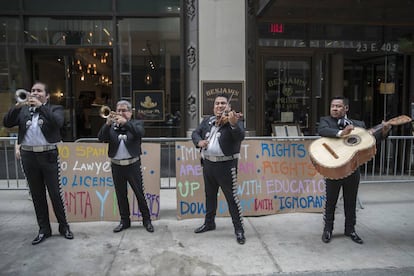Abused for speaking Spanish: “My classmates say my language is ugly”
Racist insults have increased in Donald Trump’s United States, with many Latinos feeling discriminated against for using their native tongue


The daughter of Ana Inojosa avoids speaking Spanish at her school in Brooklyn, New York. “They say it’s ugly,” the six-year-old tells her mother. When she talks in Spanish, her classmates make her feel bad. “She tells me that most of those who bother her are of Mexican origin. I think they are replicating the discrimination their parents have suffered,” says Inojosa, who left Venezuela to live in the United States two years ago.
More people speak Spanish in the United States than in Spain
Further north, in a McDonald’s on Rhode Island, Magdalena de la Cruz from Dominican Republic says she is simply not allowed to speak the language. “Our boss told us that white people feel uncomfortable if we speak Spanish, so we are forced to communicate in English,” says the 35-year-old. “I told her that is racist.”
In a country where advertisements are in Spanish, public services offer bilingual customer help and Spanish speakers are readily available to take your order, it would be untrue to say that the 55 million Latinos who live in the United States – 17.5% of the population – lack support. The problem is that there have been an increasing number of xenophobic attacks since Donald Trump came to power.
In the most recent case, a border agent asked for the documents of two women at a service station in Montana just because they were speaking Spanish. Weeks ago, a viral video captured a lawyer in New York abusing customers and a waiter in a restaurant for talking in Spanish. “This is America!” he yelled. And at the beginning of May, employees of the grocery chain Albertsons sued the company for its supposed “No Spanish” policy – which is said to have been applied even on breaks – between 2012 and 2013.
Our boss told us that white people feel uncomfortable if we speak Spanish
McDonald’s worker Magdalena de la Cruz
More people speak Spanish in the United States than in Spain, with a record 40 million people in the country (12.5%) using the language at home. But according to a study by the Pew Research Center (PRC), while the Latino population is growing, the percentage who speak Spanish is falling. “It’s a small trend but it is growing faster than before,” says Mark Lopez, director of Hispanic research at PRC. Lopez says the decline will be reflected in those under 18 who are born to Spanish-speaking parents, explaining that more Latinos are born in the United States than arrive.
More relevant than demographics is the country’s shifting attitude toward the language, says Ignacio Olmos, director of the Cervantes Institute in the United States. According to Olmos, the United States has become less linguistically isolated since bilingual schools were introduced 10 years ago. “Twenty to 25 years ago, Spanish was the language your gardener, domestic worker or cashier spoke. Today it is the language that your son learns in college,” he says. But the director does recognize that racist abuse has spiked since Trump took office. “The sense of impunity has worsened under this administration but there is also greater rejection of these types of attitudes. That is the tension we are seeing,” he explains.
Spanish was the language your gardener and domestic worker spoke. Today it is the language that your son learns in college
Cervantes Institute director Ignacio Olmos
While socially the country has become more hostile, the Equal Employment Opportunity Commission (EEOC) says the number of complaints of workplace discrimination has remained unchanged over the past two years. In 2017, the commission received 90,000 discrimination complaints, relating to the use of language, arbitrary decisions based on a person’s birthplace, abuse, among others. “We have to understand that the ‘only English’ policy isn’t illegal when it’s motivated by questions of security (in the case of firemen) or to ensure the smooth operation of a business (a salesperson and a customer) and is not implemented for discriminatory reasons,” says Joseph Olivares, an EEOC spokesperson.
Multiculturalism has thrived in big US cities but now “some of the white population fears that their country is no longer like it was and this fear has racist overtones,” says Olmos. But while some don’t want to see the change, they can’t help from hearing it. The success of Puerto Rican singer Luis Fonsi and his smash hit Despacito is a definitive sign of the changing times. When even the children of Ivanka Trump cannot resist the Latin rhythm, it is clear the next generation in the United States will be very different to the former.
English version by Melissa Kitson.
Tu suscripción se está usando en otro dispositivo
¿Quieres añadir otro usuario a tu suscripción?
Si continúas leyendo en este dispositivo, no se podrá leer en el otro.
FlechaTu suscripción se está usando en otro dispositivo y solo puedes acceder a EL PAÍS desde un dispositivo a la vez.
Si quieres compartir tu cuenta, cambia tu suscripción a la modalidad Premium, así podrás añadir otro usuario. Cada uno accederá con su propia cuenta de email, lo que os permitirá personalizar vuestra experiencia en EL PAÍS.
¿Tienes una suscripción de empresa? Accede aquí para contratar más cuentas.
En el caso de no saber quién está usando tu cuenta, te recomendamos cambiar tu contraseña aquí.
Si decides continuar compartiendo tu cuenta, este mensaje se mostrará en tu dispositivo y en el de la otra persona que está usando tu cuenta de forma indefinida, afectando a tu experiencia de lectura. Puedes consultar aquí los términos y condiciones de la suscripción digital.








































